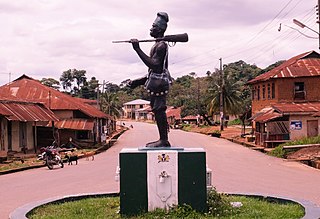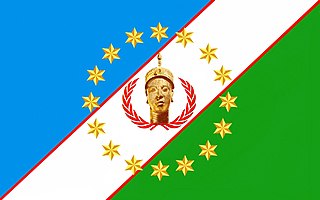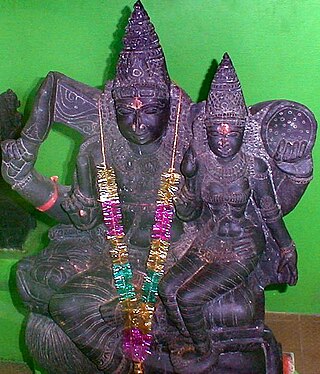Related Research Articles

Ifẹ̀ is an ancient Yoruba city in south-western Nigeria, recent in-depth archeologically estimates suggest Ife's founding to be between the 10th century BC and 6th century BC and is widely agreed upon by historians to be the oldest amongst the classical and post-classical Yoruba city-states. The city is located in present-day Osun State. Ifẹ̀ is about 218 kilometers northeast of Lagos with a population of over 500,000 people, which is the highest in Osun State according to population census of 2006.

Egungun, in the broadest sense is any Yoruba masquerade or masked, costumed figure. More specifically, it is a Yoruba masquerade for ancestor reverence, or the ancestors themselves as a collective force. Eégún is the reduced form of the word egúngún and has the same meaning. There is a misconception that Egun or Eegun is the singular form, or that it represents the ancestors while egúngún is the masquerade or the plural form. This misconception is common in the Americas by Orisa devotees that do not speak Yorùbá language as a vernacular. Egungun is a visible manifestation of the spirits of departed ancestors who periodically revisit the human community for remembrance, celebration, and blessings.

Ilesa is a historic city located in the Osun State, southwest Nigeria; it is also the name of a historic kingdom centred on that town. The state is ruled by a monarch bearing the title of the Owa Obokun Adimula of Ijesaland. The state of Ilesa consisted of Ilesa itself and a number of smaller surrounding cities.

Osun State, occasionally known as the State of Osun by the state government, is a state in southwestern Nigeria; bounded to the east by Ekiti and Ondo states, to the north by Kwara State, to the south by Ogun State and to the west by Oyo State. Named for the River Osun—a vital river which flows through the state—the state was formed from the southeast of Oyo State on 27 August 1991 and has its capital as the city of Osogbo.
The Ìgbómìnà are a subgroup of the Yoruba ethnic group, which originates from the north central and southwest Nigeria. They speak a dialect also called Ìgbómìnà or Igbonna, classified among the Central Yoruba of the three major Yoruba dialectical areas. The Ìgbómìnà spread across what is now southern Kwara State and northern Osun State. Peripheral areas of the dialectical region have some similarities to the adjoining Ekiti, Ijesha and Oyo dialects.

Omi-Ọṣun, literally meaning "Ọṣun waters", is the northernmost source tributary of the Ọṣun River in southwestern Nigeria. The Omi-Ọṣun tributary rises from the eastern sector of the Yoruba hills and flows westwards into the Òyì River which subsequently flows southward along two deep gorges within the Oke-Ila quartzite ridges,, before its confluence with other rivers to form the main Osun.
Òkè-Ìlá Òràngún is an ancient city in southwestern Nigeria that was capital of the middle-age Igbomina-Yoruba city-state of the same name.
Orangun or Ọ̀ràngún of Ìlá is the title of the paramount ruler of one of the ancient Igbomina kingdoms, a sub group of the Yoruba people with its seat and capital located in Ila Orangun, central Yorubaland, presently in southwestern Nigeria.
The Omi-Ọṣun ruins are the remains of an ancient settlement of the Òkè-Ìlá Òràngún kingdom, located along the Omi-Ọsun river in southwestern Nigeria. The ruins consist of remnants of ancient walls, potsherds, and other relics. Much of the site complex is currently overgrown with thicket, but large portions are being used as farmland. Efforts have been made since the late 1970s to persuade the paramount ruler and the local population to protect the remaining ruins from destruction by farming activity, building, and road construction. These efforts received an authoritatitive boost when the main advocate of the conservation of the ruins, a geologist/geophysicist with archaeological interests, was installed into the royal dynastic position of the Oba'lumo, which provided him with increased access to the royal councils of the Orangun, the paramount king of the region.

Ifedayo is one of the 30 local government areas of Osun State in southwestern Nigeria. It is one of the most recent local government areas to be created.
Oba-Igbomina, is an ancient Igbomina town in northeastern Isin Local Government Area of Kwara State. It is one of the five related Yoruba towns named "Oba", the others being
Ìsèdó is an ancient Igbomina kingdom in northeastern Yorubaland of Nigeria. Ìsẹ̀dó was founded as a new city-state several centuries ago by Ọba'lumọ, a Prince of the ancient Oba civilization. Ìsẹ̀dó is fully known and called "Ìsẹ̀dó-Olúmọ̀" using its founder-king's name as an identifier suffix. Ọba'lumọ, emigrated from the ancient Ọ̀bà civilization in northeastern Yorubaland.
The Obalúmo is a royal personage, a traditional monarch amongst the Igbomina clan of the Yorubas of West Africa. The earliest manifestation of his title dates back to the 12th century at the latest, making him a ruler of relative significance in the intricate chiefly hierarchy of the tribe.

The Yoruba people are a West African ethnic group who mainly inhabit parts of Nigeria, Benin, and Togo. The areas of these countries primarily inhabited by the Yoruba are often collectively referred to as Yorubaland. The Yoruba make more than 44 million people in Africa, are over a million outside the continent, and bear further representation among members of the African diaspora. The vast majority of the Yoruba population is today within the country of Nigeria, where they make up 15.5% of the country's population according to CIA estimations, making them one of the largest ethnic groups in Africa. Most Yoruba people speak the Yoruba language, which is the Niger-Congo language who has the largest number of native or L1 speakers.
The Rev. Dr. Solomon Adeniyi Babalola was a Nigerian Baptist pastor who lived and served in Nigeria, Ghana, Canada, and the United States. Born in Oke-Ila, Nigeria, he graduated from his initial pastoral training in December 1949 from the three-year theology course of the Nigerian Baptist Theological Seminary, Ogbomosho. He is reputed to be one of the two youngest Nigerian nationals ever recruited into the ministry by American missionaries, during a late-1940s drive led by Seminary President Dr. J.C. Pool, assisted by indigenous pastors. Babalola was consecrated as a Baptist trained pastor at the age of 20.

Ila or Ilā is a deity in Hindu legends, known for their sex changes. As a man, he is known as Ila or Sudyumna and as a woman, is called Ilā. Ilā is considered the chief progenitor of the Lunar dynasty of Indian kings – also known as the Aillas.
Fabunmi of Okemesi born Prince Fábùnmi Ìṣọ̀lá, also known as Orara l'ada, was a Yoruba warlord, chief and ultimately king. He was known to have singlehandedly triggered the longest civil war in Nigeria - the Kiriji War.
Igbajo is a town in the southwest of Nigeria, in the Boluwaduro Local Government Area in Osun State. Igbajo was founded in the 12th century.
References
- ↑ Barnes, Sandra T. (1997-06-22). Africa's Ogun: Old World and New. Indiana University Press. pp. 107–108. ISBN 978-0-253-11381-8.
- ↑ Usman, Aribidesi; Falola, Toyin (2019-07-04). The Yoruba from Prehistory to the Present. Cambridge University Press. p. 106. ISBN 978-1-107-06460-7.